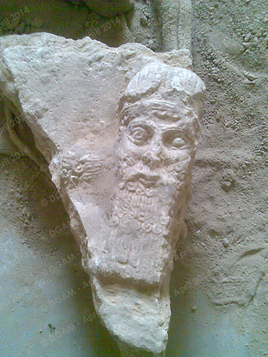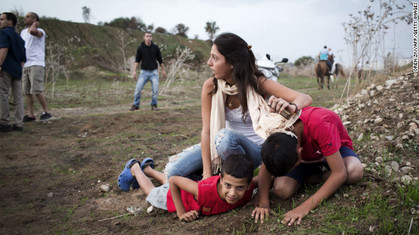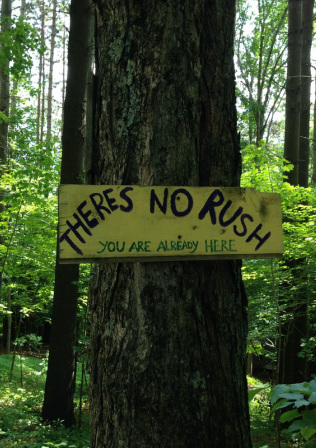That's what I did on Thursday. I sat on a rock by a picturesque lighthouse and watched the sea bounce around beneath my feat. Blue sea, blowing wind, hot sun, white foam, brown earth, and me – all the essential elements were present for a splendid day of just being in this beautiful world. We all need something like this in our lives. Each of us needs a way to escape from the usual patterns of our daily lives and retreat to a place of safety that allows us to consider, to ponder, to relax and to just be. We need a time and a place for the silence to enfold us. Moments like this are more than just relaxing. They can be deeply spiritual. It is in the places of quiet and stillness that we are able to notice our own presence in the world in a way that is nearly impossible while we are engaged in the business of doing things, getting things done, striving and managing. The still moments are the ones in which we become aware of the miracle of existence and the treasure of being alive. We need to do things in life, but, just as much, we also need quiet moments to digest the meaning and ponder the purpose of our activity. Such moments, however, are becoming harder to find in our hyperactive society. We are always in a rush. Television teaches us that silence is awkward and frightening. (Have you ever known someone who leaves the television or radio on all day just to avoid silence?) The habit has even become part of conversational patterns in which people constantly interrupt each other to avoid the possibility of a gap between speakers. Let me ask you right now, while you are reading this, to try an experiment. Close your eyes, slow your mind, relax your breathing, be aware of your body, and just sit in silence for a few minutes. When you notice yourself getting itchy with the urge to open your eyes and do something, just let that feeling to be something else to be aware of. Let the itchiness subside and allow yourself to enter a moment of even deeper peace. It feels good – doesn't it? It is altogether appropriate to make time for such moments in worship. The Jewish worship service is filled with moments for silence and stillness. Traditionally, the T'filah prayer (also called the Amidah or the Sh'moneh Esrei) is first recited aloud by the worship leader, and then silently by each individual in prayer. Also, in most traditional Ashkenazic services, much of the morning blessings are recited silently by each individual with the worship leader only chanting an occasional verse or two to keep everyone more-or-less in the same place. The opportunity for silence gives each worshiper a moment of stillness and the spiritual space to encounter God. We discover, in such moments, that silence is a form of praise to the God who fills all silences. In liberal Judaism, we sometimes try to squeeze the silence out of our services. Out of a desire to shorten the service – or, perhaps, out of fear that people won't know what to do during silence – we fill every moment with words and songs. I think that is a mistake. I think we need to give people a chance during worship for the many words of the liturgy to sink in. We need to give people a chance to have their own thoughts. We need to take the risk that moments of quiet can be more than moments of itchy emptiness.
 An ancient Assyrian artifact destroyed by ISIL. An ancient Assyrian artifact destroyed by ISIL. We all know that the Hebrew Bible was written a long time ago. We assume that many of the Bible's teachings were intended for a different political and social reality than ours. Sometimes, therefore, we are tempted to dismiss biblical teachings we find difficult, or even offensive, because, we say, they were "written for a different time." What we may not recognize though, is that the Hebrew Bible was very old already when the rabbis created the religion we know today. The rabbis who transformed a national cult of ritual sacrifices into a tradition of study, prayer and doing mitzvot were willing and able to accept the difficult parts of the Bible that must have seemed to them to be "written for a different time." How? What did the rabbis do to make the Bible – even the parts written a thousand years before them – relevant to their time? The rabbis began by assuming that the Hebrew Bible is a sacred text, a gift from God. Therefore, when parts of the Bible seemed to them to be out-of-step with the values and realities of their times, they assumed that there had to be a deeper meaning to be found through interpretation. Rather than simply reject the parts of the Bible we don't like, we can take a cue from from the ancient rabbis and probe for meanings hidden beneath the surface. This week's Torah portion (Re'eh), for example, includes a passage that might make us cringe:
In the context of today's world, this passage sounds like a call for cultural extermination that reminds us of the Taliban destroying ancient Buddhist statues or the Islamic State's destruction of medieval mosques. That our own tradition might teach such behavior is distressing to us.  Sh'ma Yisrael Adonai Eloheinu Adonai Echad. "Listen, Israel. Adonai is our God. Adonai is One." – Deuteronomy 6:4 There is a tradition that says that we should cover our eyes when we recite the first six words of the Shema during the morning and evening service. There are many explanations for this practice, but the most common is that we should prevent ourselves from being distracted when we recite such an important prayer (Shulchan Aruch, Orach Chaim 61:5). But what would distract us? If we are truly engaged in prayer, it seems to me, we should be be able to endure anything unusual that might enter our field of vision – an unexpected flash of sunlight, a person walking nearby, or an insect flying in front of us. Why should such trivialities bother us while we declare God's unity and the idea that ours is the God of the universe? But there is a deeper possibility in the meaning of this practice. When we recite the Shema, we are declaring God's oneness. This is the idea that God is the unity of all unities. In God, everything is one. We hear these words and we recognize that there is nothing that God is not. This is why we cover our eyes. If they were open, we would be distracted just by seeing the differentiation all around us. We would see the floor and believe it to be separate from the ceiling. We would see a chair and believe that it is separate from a table. We would see other people and believe that they are separate from ourselves. We would see ourselves and believe that we are separate from God. We close our eyes while reciting the Shema so that we can remember, just for a moment, that these are all distracting illusions. We know for an instant that everything we can perceive, everything we can experience, and everything we are is a part of God. The next time you say the words, Sh'ma Yisrael Adonai Eloheinu Adonai Echad, close your eyes and allow yourself to be a part of the profound unity of all existence that is contained within God. Close your eyes and allow yourself to see. Other Posts on This Topic: Va'etchanan: Six Words Va'eira: The God of Everything and Everywhere  An Israeli woman and her children take cover as sirens wail in Tel Aviv. (CNN) An Israeli woman and her children take cover as sirens wail in Tel Aviv. (CNN) The last several weeks have been horrifying, upsetting, angering, heartbreaking and mind numbing. The news from Israel and Gaza has put me and many members of my community on an emotional roller coaster as we try, simultaneously, to take in the many sickening images and stories, grieve the destruction and loss of life on both sides, while also standing up for Israel as she defends herself. It has been emotionally exhausting. I won't rehearse here all the charges and counter-charges about rockets, human shields, tunnels, arial assaults near schools and hospitals, and the deaths of so many children. Chances are, you've already made up your mind about all of that. I will say, though, that I am hard-pressed to imagine how else Israel could respond to the rain of rockets falling on its cities. I don't know how any country could respond successfully to an enemy that intentionally endangers civilians so that it can use their deaths as a propaganda and recruitment tool. What on earth would you do? And just as the conflict in Israel and Gaza appears to be winding down, we today have Tisha B'Av, the most mournful day of the Jewish year. Tisha B'Av commemorates the cosmic devastation experienced by the Jewish people in ancient times when the First Temple was destroyed in 586 BCE and when the Second Temple was destroyed in 70 CE. To Jews, the day marks a rupture in the bonds that connect heaven to earth. It is our "Black Fast." You would think the coincidence of such a dark day at a time like this would feel like a further burden. In fact, it comes as a relief. Last night we marked Tisha B'Av at the congregation I serve with a service that included the chanting and reading of the book of Lamentations. This 2,600 year-old book of poetry speaks of the anguish of war, death, inhumanity, grief and despair. As I listened to the words, I thought about the suffering of the people of Gaza. Knees weak, eyes full of tears, and even my bowels bothered, I am sick with grief for the city's wreck and my people's ruin as I see our sorry children and even suckling babes collapse in the desolate streets. The discussion that followed was amazing. People let loose the pain of the past few weeks, but also the horror of the Holocaust, the carnage happening right now in Iraq and Syria, the poverty that still ravages parts of our own country. We remembered that Tisha B'Av this year falls one day before the 69th anniversary of the bombing of Hiroshima and the horror that it inflicted. We gave voice to the sense that there is something deeply and heartbreakingly wrong with this poor world.
We talked about how difficult it is to know where we should put the blame. On God? On "Evil"? On the human race? On the failure within each of our own individual hearts to live up to our highest aspirations? Ultimately, there can be no answers. No answers – but there is still hope. Our group could not end the evening until we also talked about the belief that each of us has the ability to make the world better. We remembered the teaching that the destruction of the Second Temple came about because of "baseless hatred" among Jews and we pledged to each do our part to replace resentment, anger and disdain with compassion, love and acceptance. Every little bit helps. Tisha B'Av, for me, comes this year at just the right moment. It comes at a time when I have to cry out in sorrow. It comes during a period in which I have been sick with grief and only partially recognized it. Tisha B'Av this year opens my heart to wailing for a world that is not what it should be, but a world that can yet be redeemed. Other Posts on This Topic: Catastrophe Not Turning Away from Grief |
WelcomeThis blog is about living a joyful Jewish life and bringing joy to synagogues and the Jewish community. Join the conversation by commenting on posts and sharing your experiences. For more on the topic, read the First Post.
Recent PostsPurim & COVID-19
The Honor of Heaven Chasing Our Own Tails Drilling Under Your Seat Change the World Self-Righteousness Where We Came From What We Must Believe Is Passover 7 or 8 Days?Origin Story Va'eira: Leadership Jeff's Favorites• First Post
• Searching for How the Bible Defines Marriage • The Difference between God and Religion • In the Beginning of What? • Rape, Abortion and Judaism • Ten Thoughts about Being a Rabbi • Temple Dues and Don'ts • A Pesach Lesson from Yoga • The Purpose of the Torah Torah PortionsGenesis
Bereshit Noach Lech Lecha Vayera Chayei Sarah Toledot Vayetze Vayishlach Vayeshev Miketz Vayigash Vayechi Exodus Shemot Va'eira Bo Beshalach Yitro Mishpatim Terumah Tetzaveh Ki Tisa Vayakhel Pekudei Leviticus Vayikra Tzav Shemini Tazria Metzora Acharei Mot Kedoshim Emor Behar Bechukotai Numbers Bamidbar Naso Beha'alotecha Shelach Korach Chukat Balak Pinchas Matot Masei Deuteronomy Devarim Va'etchanan Ekev Re'eh Shoftim Ki Tetze Ki Tavo Nitzavim Vayelech Ha'azinu Vezot Haberachah Holidays Shabbat Rosh Chodesh Pesach/Passover Omer Period Yom HaShoah Yom HaZikaron Yom Ha'atzma'ut Pesach Sheini Lag B'Omer Yom Yerushalayim Shavuot Fast of Tammuz Tisha B'Av Tu B'Av Rosh Hashanah Days of Awe Yom Kippur Sukkot Hoshanah Rabbah Shmini Atzeret/ Simchat Torah Chanukah Tu BiShvat Adar (Joy Increases!) Purim Archives
October 2023
Loading
|

|
|

 RSS Feed
RSS Feed
